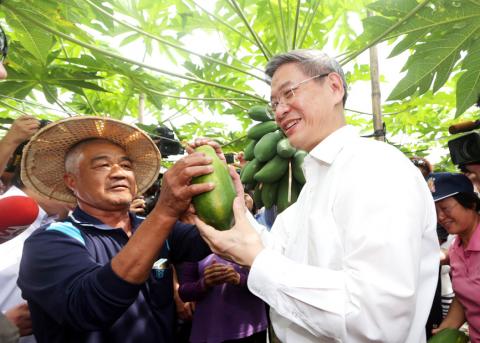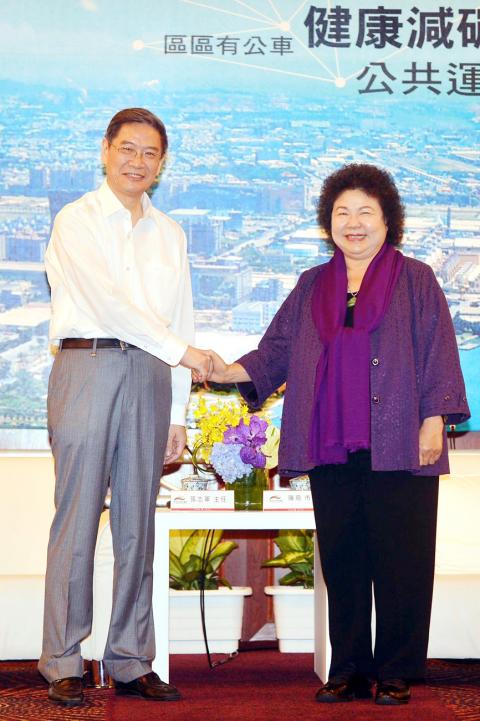China’s top Taiwan policymaker yesterday said that Beijing respects the “social system and lifestyle” that Taiwan has “chosen” as well as the “values and ideas” Taiwanese have embraced, but stopped short of saying whether it also respects the right of Taiwanese to make their choices about the nation’s future.
Taiwan and China have taken different paths in development, but they still share a common history, China’s Taiwan Affairs Office (TAO) Minister Zhang Zhijun (張志軍) told reporters after his 40-minute closed-door meeting with Greater Kaohsiung Mayor Chen Chu (陳菊) at a hotel in the city.
“We understand that Taiwanese cherish the social system and lifestyle that they have chosen. The mainland [China] respects the social system, values, ideas and lifestyles Taiwanese have chosen,” Zhang said when he gave the press a rundown of his conversation with Chen.

Photo: CNA
Asked about Zhang’s remarks at a separate setting, Chen relayed what Zhang said at their meeting.
“He [Zhang] was of the opinion that mainland China has repeatedly said on various occasions that it respects the lifestyle of the Taiwanese within the current liberal democratic system,” she said.
Chen said she told Zhang that he should regard the protests he has encountered in Taiwan as “normal,” because they are part of Taiwan’s democratic system, adding that she appreciated Zhang’s understanding of the situation.

Photo: AFP
Asked whether Zhang’s remarks suggest that Beijing would revise the statement TAO spokesperson Fan Liqing (范麗青) made prior to Zhang’s arrival — that the future of Taiwan should be decided by all Chinese, including “compatriots” in Taiwan — Chen said the question was not addressed at the meeting.
“But I told him that the recent remarks made by the TAO were not acceptable to the ruling and opposition parties in Taiwan,” said Chen, a member of the Democratic Progressive Party.
Zhang’s remarks echoed what Chinese President Xi Jinping (習近平) said in February when he met with former vice president and Chinese Nationalist Party (KMT) chairman Lien Chan (連戰) in Beijing.
Zhang also told reporters that Beijing welcomes people from all walks of life in Taiwan to engage in the peaceful development of cross-strait relations, regardless of which city or county they come from, and no matter what their political affiliation or religious beliefs are.
Asked about the prospects of the DPP conducting exchanges with Chinese authorities after Zhang’s visit, Chen said: “What the future holds for us will take its course.”
“What we need to do now is to foster mutual understanding and respect for each other,” she said.
“As to whether there will be more high-level exchanges between the two sides, I can only say: Each side has extended an olive branch and is more likely to get to know each other,” Chen said.
Several DPP members, including former legislator Julian Kuo (郭正亮), have sought to freeze the “Taiwan independence clause” in its charter to remove what they see as a barrier to engagement with China.
Kuo, along with other academics, was at a closed-door meeting with Zhang on Thursday night in Taipei. He said that when he asked Zhang whether the Chinese Communist Party would be willing to engage in talks with the DPP if the party puts the clause on ice, Zhang replied that when they look at a party, they look beyond its charter to its policies and actions.
Chen said the clause was not brought up in her meeting.
Chen added that she told Zhang that China could consider increasing the number of cross-strait flights between Kaohsiung International Airport and cities in China.
They also talked about exports of Taiwanese agricultural and aquatic products to China and the opening of Taiwan to Chinese tourists, with Chen saying that nepotism and cronyism have plagued some businesses, which benefit only politicians, rather than fishermen, small businesses and ordinary people.
In Taipei, the Black Island National Youth Front and Democracy Kuroshio called on Chen, a former prisoner of conscience, to value human rights and take public demands into account.
“Be sure not to sacrifice Taiwan’s hard-won democracy for the sake of economic growth,” they said.
Zhang also met Mainland Affairs Council Minister Wang Yu-chi (王郁琦) for a chat over tea last night.
Wang said Zhang proposed that Taipei and Beijing begin political talks to resolve long-term disagreements.
Wang said he responded that the time was not ripe for political talks given the lack of public consensus on the issue. He added that he told Zhang that China should extend more olive branches to address long-term issues that concern Taiwanese.
Additional reporting by Alison Hsiao

Tropical Storm Gaemi strengthened into a typhoon at 2pm yesterday, and could make landfall in Yilan County tomorrow, the Central Weather Administration (CWA) said yesterday. The agency was scheduled to issue a sea warning at 11:30pm yesterday, and could issue a land warning later today. Gaemi was moving north-northwest at 4kph, carrying maximum sustained winds near its center of up to 118.8kph and gusts of 154.8kph. The circumference is forecast to reach eastern Taiwan tomorrow morning, with the center making landfall in Yilan County later that night before departing from the north coast, CWA weather forecaster Kuan Shin-ping (官欣平) said yesterday. Uncertainty remains and

SEA WARNING LIKELY: The storm, named Gaemi, could become a moderate typhoon on Wednesday or Thursday, with the Taipei City Government preparing for flooding A tropical depression east of the Philippines developed into a tropical storm named Gaemi at 2pm yesterday, and was moving toward eastern Taiwan, the Central Weather Administration (CWA) said. Gaemi could begin to affect Taiwan proper on Tuesday, lasting until Friday, and could develop into a moderate typhoon on Wednesday or Thursday, it said. A sea warning for Gaemi could be issued as early as Tuesday morning, it added. Gaemi, the third tropical storm in the Pacific Ocean this typhoon season, is projected to begin moving northwest today, and be closest to Taiwan on Wednesday or Thursday, the agency said. Today, there would likely

DISRUPTIONS: The high-speed rail is to operate as normal, while several airlines either canceled flights or announced early departures or late arrivals Schools and offices in 15 cities and counties are to be closed today due to Typhoon Gaemi, local governments announced last night. The 15 are: Taipei, New Taipei City, Taoyuan, Tainan, Keelung, Hsinchu and Kaohsiung, as well as Yilan, Hualien, Hsinchu, Miaoli, Chiayi, Pingtung, Penghu and Lienchiang counties. People should brace for torrential rainfall brought by the storm, with its center forecast to make landfall on the east coast between tonight and tomorrow morning, the Central Weather Administration (CWA) said. The agency issued a sea warning for the typhoon at 11:30pm on Monday, followed by a land warning at 11:30am yesterday. As of

CASUALTY: A 70-year-old woman was killed by a falling tree in Kaohsiung as the premier warned all government agencies to remain on high alert for the next 24 hours Schools and offices nationwide are to be closed for a second day today as Typhoon Gaemi crosses over the nation, bringing torrential rain and whipping winds. Gaemi was forecast to make landfall late last night. From Tuesday night, its outer band brought substantial rainfall and strong winds to the nation. As of 6:15pm last night, the typhoon’s center was 20km southeast of Hualien County, Central Weather Administration (CWA) data showed. It was moving at 19kph and had a radius of 250km. As of 3pm yesterday, one woman had died, while 58 people were injured, the Central Emergency Operation Center said. The 70-year-old